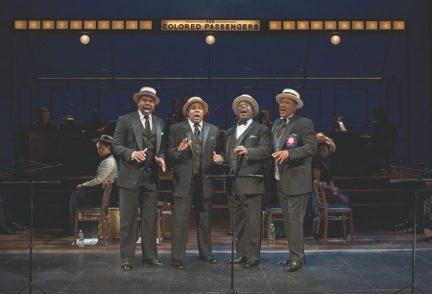
The songs remains the same in director Robert O’Hara’s new rendition of The Music Man, but the context is dramatically different.
O’Hara retains Meredith Willson’s classic tunes and much of the dialogue, but with an all-black cast. This injects a new style to the same setting and historic period. O’Hara’s shift from the original is telegraphed right from the beginning, as the famous “Rock Island” opening scene takes place in a train car “For Colored Passengers.” The “Colored” sign remains a permanent fixture throughout the show and is a constant reminder for the audience to reevaluate these classic songs in a different context.
As in the original, swindling traveling salesman Harold Hill (Isaiah Johnson) rolls into River City, Iowa, promising band instruments and music lessons that will keep the town’s youth away from the local billiard table and out of trouble. River City folk are unaware of Hill’s scheme to hop on the late night train out of town before anyone toots a single C note. Only the shrewd librarian and piano teacher Marian Paroo (Stephanie Umoh) sees the truth about Hill. Despite Hill’s fake credentials, a romance between them ensues.
The difficulty, and simultaneous intrigue, of revisionist adaptations is deciding where to stay true to the original and where to deviate. In the case of Marian Paroo’s character, her early feminist views appear even more progressive within O’Hara’s subtext of post-slavery America. The same cannot be said of Marian’s mother, Mrs. Paroo (Myra Lucretia Taylor), whose attempt at an Irish accent detracts from the strength and humor of her character. Or intended humor, at least.
The highlight of the show is the actors’ voices and musical ability; especially the vivid duet “Til There Was You” by Johnson and Umoh. But the casts’ outstanding vocal work is not enough to carry the whole performance. The production relies on the songs to tell the story. This makes for a lively show, but the plot is not always clear. Often the actors seem unrehearsed. At times, they flip through their lines on music stands, a frequent distraction. Other times, the cast misspoke their lines entirely, making the already jump narration even more difficult to follow.
Without clear narration, O’Hara’s rendition is not well suited for audiences unfamiliar with The Music Man. But his success in adapting Willson’s classic into a new context is admirable and proves the musical’s universal message.
The show ran at the New Jersey Performing Arts Center and the Two River Theatre in Red Bank as part of the New Jersey Theatre Alliance’s Stages Festival, going on this month.
